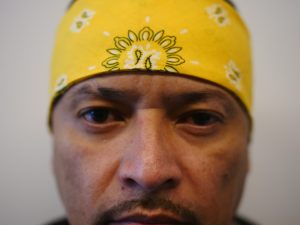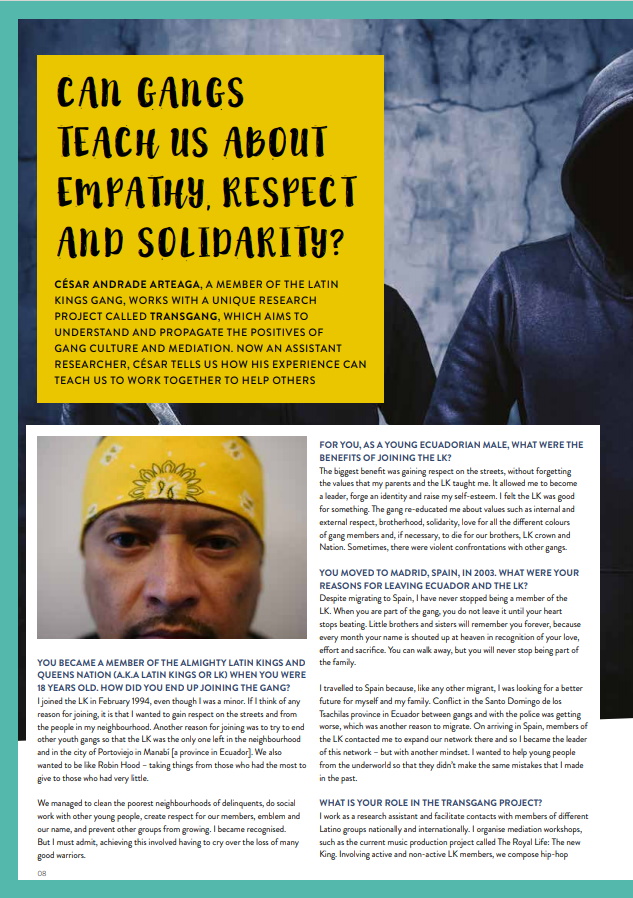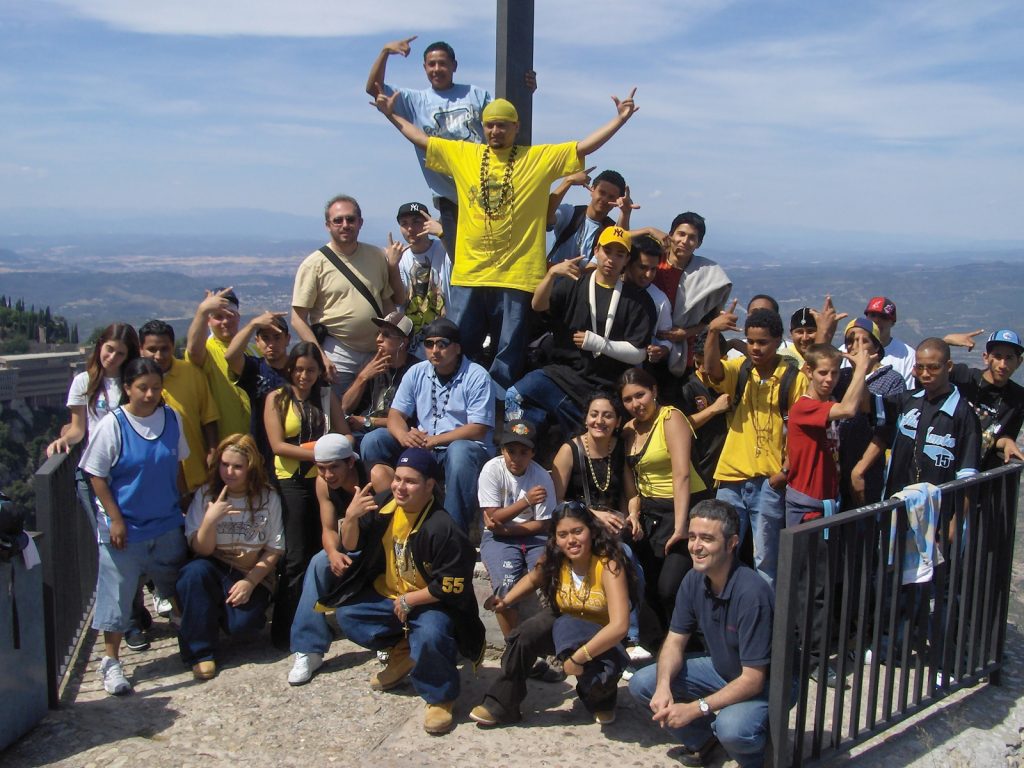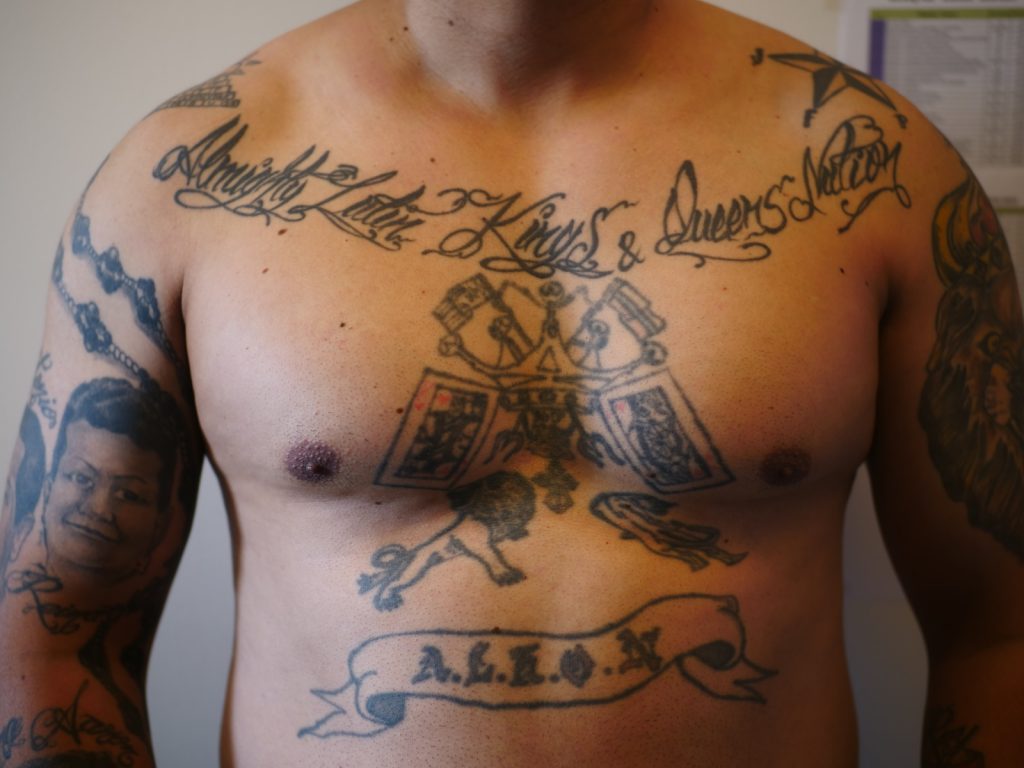Can gangs teach us about empathy, respect and solidarity?
César Andrade Arteaga, a member of the Latin Kings gang, works with a unique research project called TRANSGANG, which aims to understand and propagate the positives of gang culture and mediation. Now an assistant researcher, César tells us how his experience can teach us to work together to help others
YOU BECAME A MEMBER OF THE ALMIGHTY LATIN KINGS AND QUEENS NATION (A.K.A LATIN KINGS OR LK) WHEN YOU WERE 18 YEARS OLD. HOW DID YOU END UP JOINING THE GANG?
I joined the LK in February 1994, even though I was a minor. If I think of any reason for joining, it is that I wanted to gain respect on the streets and from the people in my neighbourhood. Another reason for joining was to try to end other youth gangs so that the LK was the only one left in the neighbourhood and in the city of Portoviejo in Manabí [a province in Ecuador]. We also wanted to be like Robin Hood – taking things from those who had the most to give to those who had very little.
We managed to clean the poorest neighbourhoods of delinquents, do social work with other young people, create respect for our members, emblem and our name, and prevent other groups from growing. I became recognised. But I must admit, achieving this involved having to cry over the loss of many good warriors.
FOR YOU, AS A YOUNG ECUADORIAN MALE, WHAT WERE THE BENEFITS OF JOINING THE LK?
The biggest benefit was gaining respect on the streets, without forgetting the values that my parents and the LK taught me. It allowed me to become a leader, forge an identity and raise my self-esteem. I felt the LK was good for something. The gang re-educated me about values such as internal and external respect, brotherhood, solidarity, love for all the different colours of gang members and, if necessary, to die for our brothers, LK crown and Nation. Sometimes, there were violent confrontations with other gangs.
YOU MOVED TO MADRID, SPAIN, IN 2003. WHAT WERE YOUR REASONS FOR LEAVING ECUADOR AND THE LK?
Despite migrating to Spain, I have never stopped being a member of the LK. When you are part of the gang, you do not leave it until your heart stops beating. Little brothers and sisters will remember you forever, because every month your name is shouted up at heaven in recognition of your love, effort and sacrifice. You can walk away, but you will never stop being part of the family.
I travelled to Spain because, like any other migrant, I was looking for a better future for myself and my family. Conflict in the Santo Domingo de los Tsachilas province in Ecuador between gangs and with the police was getting worse, which was another reason to migrate. On arriving in Spain, members of the LK contacted me to expand our network there and so I became the leader of this network – but with another mindset. I wanted to help young people from the underworld so that they didn’t make the same mistakes that I made in the past.
YOU BECAME A MEMBER OF THE ALMIGHTY LATIN KINGS AND QUEENS NATION (A.K.A LATIN KINGS OR LK) WHEN YOU WERE 18 YEARS OLD. HOW DID YOU END UP JOINING THE GANG?
I joined the LK in February 1994, even though I was a minor. If I think of any reason for joining, it is that I wanted to gain respect on the streets and from the people in my neighbourhood. Another reason for joining was to try to end other youth gangs so that the LK was the only one left in the neighbourhood and in the city of Portoviejo in Manabí [a province in Ecuador]. We also wanted to be like Robin Hood – taking things from those who had the most to give to those who had very little.
We managed to clean the poorest neighbourhoods of delinquents, do social work with other young people, create respect for our members, emblem and our name, and prevent other groups from growing. I became recognised. But I must admit, achieving this involved having to cry over the loss of many good warriors.
FOR YOU, AS A YOUNG ECUADORIAN MALE, WHAT WERE THE BENEFITS OF JOINING THE LK?
The biggest benefit was gaining respect on the streets, without forgetting the values that my parents and the LK taught me. It allowed me to become a leader, forge an identity and raise my self-esteem. I felt the LK was good for something. The gang re-educated me about values such as internal and external respect, brotherhood, solidarity, love for all the different colours of gang members and, if necessary, to die for our brothers, LK crown and Nation. Sometimes, there were violent confrontations with other gangs.
YOU MOVED TO MADRID, SPAIN, IN 2003. WHAT WERE YOUR REASONS FOR LEAVING ECUADOR AND THE LK?
Despite migrating to Spain, I have never stopped being a member of the LK. When you are part of the gang, you do not leave it until your heart stops beating. Little brothers and sisters will remember you forever, because every month your name is shouted up at heaven in recognition of your love, effort and sacrifice. You can walk away, but you will never stop being part of the family.
I travelled to Spain because, like any other migrant, I was looking for a better future for myself and my family. Conflict in the Santo Domingo de los Tsachilas province in Ecuador between gangs and with the police was getting worse, which was another reason to migrate. On arriving in Spain, members of the LK contacted me to expand our network there and so I became the leader of this network – but with another mindset. I wanted to help young people from the underworld so that they didn’t make the same mistakes that I made in the past.
WHAT IS YOUR ROLE IN THE TRANSGANG PROJECT?
I work as a research assistant and facilitate contacts with members of different Latino groups nationally and internationally. I organise mediation workshops, such as the current music production project called The Royal Life: The new King. Involving active and non-active LK members, we compose hip-hop and rap songs related to our life events. It is a mediation project that works with young migrants from Barcelona. We have already produced three songs and a video of a fourth song is about to come out, which we will publish on our YouTube channel.
I organise the TRANSGANG project library, which involves collecting press releases, transcribing interviews and documenting the project. I’m also the webmaster of a blog about a book called El Rey (The King), published together with Dr Carles Feixa Pàmpols, the principal investigator on the TRANSGANG project.
I have known Carles since 2005 and have collaborated with him on various projects, as an informant. The TRANSGANG project gave me the opportunity to work as a research assistant.
WHY IS THE TRANSGANG PROJECT IMPORTANT TO YOU PROFESSIONALLY AND PERSONALLY?
From a professional point of view, the project has allowed me to enter the world of social research and learn about techniques and methods that will open doors for me when this project has ended. My computer skills and knowledge have advanced a lot and I’m discovering other youth gangs, which I didn’t know about previously. I’m also learning about how mediation works. All of this is a great professional leap for me.
From a personal point of view, I’m meeting professionals with a huge amount of knowledge and human values, who make me a better person every day. Thanks to the TRANSGANG collaboration, I’ve been able to obtain Spanish residency and citizenship. This allows me to stabilise my life, not fall prey to temptations, and to look to the future with optimism.
HOW HAS YOUR EXPERIENCE WITH THE LK SHAPED YOU?
Indirectly, LK was already mediating between Latino youth gangs as well as organising cultural and sporting events, and this has given me relevant experience to work on the TRANSGANG project. I also learned leadership skills and to apply the values that represent LK as a group: love, honour, obedience, sacrifice and righteousness – five sacred points of the LK crown.
WHAT POSITIVE ATTRIBUTES DOES YOUR EXPERIENCE BRING TO SOCIETY?
Having experienced some dramatic things in my country, Ecuador, my life experience serves as an example to other young gang members so that they don’t fall into violent attitudes and can become better people. Furthermore, gang values, in our current world, can serve as a model to show that human relationships can be different; they can be based on empathy, solidarity and mutual respect.
WHAT ADVICE DO YOU HAVE FOR YOUNG PEOPLE WHO ARE GANG MEMBERS?
I would never ask you to leave your gang because it is a family for you, a feeling you carry inside. What I would ask is that you don’t commit violent or criminal acts; on the contrary, I’d ask that you work together to help others see that this path leads nowhere.
WHAT CAN YOUNG PEOPLE WHO AREN’T GANG MEMBERS LEARN FROM THE TRANSGANG PROJECT?
You can learn about the true motivations behind belonging to a gang – the reasons why gang members want to belong and that it is about seeking help in different way. You’ll learn about our identity, our history, our values, which have been violent at times in the past, but are actually about benefiting everyone and living harmoniously. We are not violent people, so we can try to end the negative labels that everyone puts on us. This is the most important thing: to teach young people about who we really are and what we truly stand for.
 ABOUT CÉSAR ANDRADE ARTEAGA and TRANSGANG
ABOUT CÉSAR ANDRADE ARTEAGA and TRANSGANG
César Andrade Arteaga (Pórtoviejo, Manabi-Ecuador 1976) has been a member of the ALKQN (Almighty Latin Kings & Queens Nation) since 1994. At that time LK’s activities and projects were internal and were not publicly recognised by the authorities. In 2003, César arrived in Madrid (Spain) with the purpose of working and helping his family. In 2005-6, he and other LK members met with the Barcelona local government to set the LK group up as a legally-accepted youth organisation called the “Cultural Organization of Kings and Queens of Catalonia”.
The TRANSGANG project is led by Dr Carles Feixa Pàmpols at Pompeu Fabra University, Spain. Its aim is to understand the positives of gang culture and how to resolve conflict through mediation rather than violence. To learn more, visit: https://www.upf.edu/web/transgang/project



